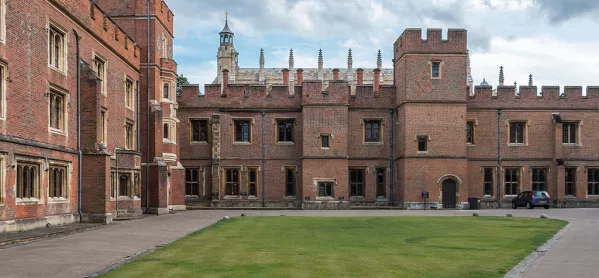Eton College is giving its pupils lessons in gratitude and empathy.
Pupils at the £40,700-a-year school are being taught how to be more grateful, as part of the college’s focus on character education.
Quick read: Hogwarts effect stronger overseas than at home, boarding-school leader says
Insight: Hinds to call time on ‘public-school confidence’
Research: Private schools: record fees and 5 other findings
Jonnie Noakes, Eton’s head of teaching and learning, said: “There’s a proven connection, across numerous different cultures, between being grateful and happiness. Largely, it’s about awareness.
“You don’t have to be hugely privileged to be grateful - all of us can be grateful. You don’t have to be an Etonian to be grateful.”
The decision to offer these lessons followed an internal review, during which pupils and staff were asked what character traits they felt the school valued.
“They thought that gratitude was terribly important, but not currently promoted,” Mr Noakes said.
So pupils are now taught to take a moment each day to acknowledge who has helped them and who they have to be grateful to.
“Most of us have all kinds of people to be grateful to, if you think about it,” Mr Noakes said. “Thinking about it increases their gratitude.”
For example, he says, pupils might write thank-you cards to people for everyday acts of kindness: “Thank you for taking time to talk to me today.”
Mr Noakes was speaking to Tes at the annual Boarding Schools Association conference, held in London this week.
Eton pupils have also been offered lessons in empathy and kindness.
“You can teach empathy - it’s not an inbuilt trait,” Mr Noakes said. “It’s about imaginative identification with others. You can teach people to use that, and overcome their natural wariness and mistrust.”
Interviewing another person, he said, is a good way to understand someone better, and to appreciate that person’s of view.
“Most human beings have empathy in abundance - it just needs to be encouraged,” Mr Noakes said.
Eton has also used the theory of growth mindset in order to promote kindness among pupils.
“If you have a fixed mindset, you have to prove yourself against others,” Mr Noakes said.
“If you have a growth mindset, you look at how to improve yourself. You have to work with others for that, so it sets up a trusting environment, and promotes collaboration.”
Teaching gratitude, empathy and kindness, he added, is not simply about providing pupils with skills for future employment.
“This isn’t just a utilitarian argument that will make people more employable,” he said. “It will also make them more happy. It’s educating the human heart - it matters.”




